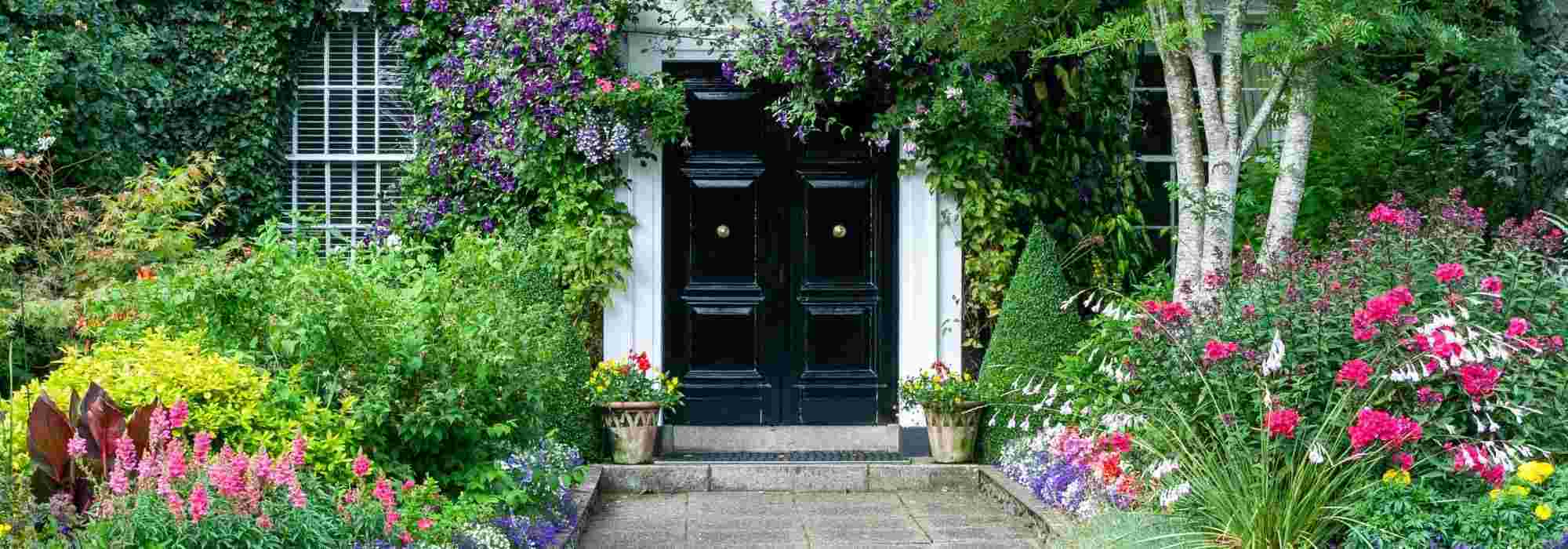
How to create a welcoming entrance?
Our tips for a successful entry
Contents
Interior decoration of the home is one of the favourite pastimes of the French. However, having a welcoming entrance outside is also important, as it is the first impression your home will leave on your visitors and passers-by. Moreover, you use this space daily; if it is neglected and non-functional, it can create a sense of frustration. So don’t overlook the front of your home and draw inspiration from our ideas to create a charming passageway that is easy to maintain and aesthetically pleasing. All it takes is finding your style and a bit of imagination to carefully decorate the exterior entrance of your home. Discover our tips for arranging it!
Install potted plants
By potting plants in spring, you can allow for the installation of less hardy plants that would not survive the winter in the ground. Of course, they will need to be stored away later before the onset of severe cold. Additionally, choose your pots according to the style you wish to give to your entrance. For example, woven wicker pots will be perfect for creating a bucolic, rustic, and natural atmosphere. Intermingle decorations, such as a few lanterns that are very trendy at the moment. Pots with more modern shapes and current colours will create a contemporary arrangement. Here are some suggestions for potted plants:
Sun exposure
- the Felicia amelloides forming a beautiful ball of sky-blue daisies
- the Iberis sempervirens ‘Masterpiece’ with bright white flowers
- the Salvia greggi ‘Icing Sugar’ to be placed in a large pot
- the Carex testacea ‘Prairie Fire’ with lovely orange leaves
Partial shade exposure
- the Billbergia nutans which will need to be stored in winter
- the Cyrtomium fortunei to be sheltered from the afternoon sun
- the Gentiana scabra ‘Royal Stripes’ with its stunning bicolour flowering
Shade exposure
- Hosta for which there is an impressive number of different varieties
- the Aspidistra elatior forming a clump of dark green, glossy foliage
- the Hellebore orientalis ‘Double Rose’ for winter and early spring flowering
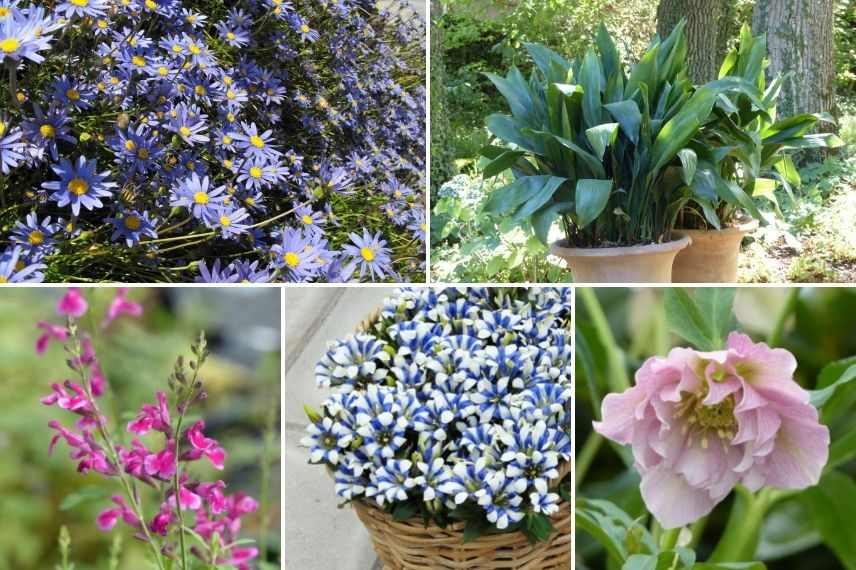
Felicia amelloides (photo Wikipedia), Aspidistra elatior, Salvia ‘Icing Sugar’, Gentiana ‘Royal Stripes’ and Helleborus ‘Double Rose’
Read also
Designing a garden in front of a housePlant evergreen plants
To avoid leaving your entrance naked, prefer evergreen plants that will decorate your entrance throughout the year. It is worth noting that evergreen plants are more sensitive to cold than those with deciduous foliage. Here is a selection that will dress your entrance with bushes and perennial plants featuring varied foliage:
Sun exposure
- Festuca glauca ‘Elijah Blue’, blue and very hardy
- Salvia officinalis ‘Tricolor’ with variegated foliage of pink, white, and green
- Aubrieta x cultorum ‘Hamburger Stadtpark’ forming a carpet of intense violet flowers
- Nandina domestica ‘Brightlight’ with changing foliage, to be planted in a large pot
Partial shade exposure
- Aucuba japonica ‘Crotonifolia’ with green foliage speckled with yellow
- Ajuga tenorii ‘Princess Nadia’ with blue flowers and changing variegated foliage
- Euphorbia amygdaloides ‘Purpurea’ forming a persistent purple clump
Shade exposure
- Bergenia ‘Eden’s Dark Margin’ with its red-edged leaves turning brown in autumn
- Heuchera offering a wide palette of colours for its foliage
- Liriope muscari with purple flowering spikes from August to October
- Vinca minor ‘Gertrude Jekyll’, when installed in suspension, will form a cascade of white flowers
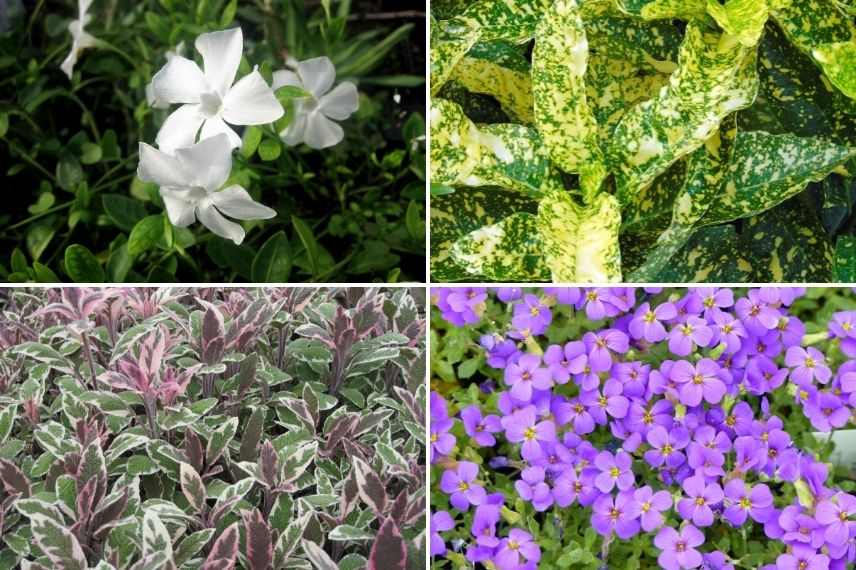
Vinca minor ‘Gertrude Jekyll’, Aucuba japonica ‘Crotonifolia’, Salvia officinalis ‘Tricolor’, and Aubrieta ‘Hamburger Stadtpark’
Focus on topiaries
With topiaries, that is to say, plants trimmed into various and well-defined geometric shapes, it is possible to play with symmetry. Indeed, two beautiful bushes trimmed in the same way and placed on either side of a front door give an elegant and refined style to the front of a house. On the other hand, a regular pruning is necessary to maintain beautiful homogeneous shapes. Additionally, avoid Boxwood, which is often the victim of box tree moth and fungal diseases. Here are some examples of plants that can be used for topiary:
Sun exposure:
- Yew, which also tolerates shade
- Privet
- Burkwood Osmanthus with fragrant flowers, it can also be planted in partial shade
Partial shade exposure
- Lonicera nitida known as Box-leaved Honeysuckle, as its leaves resemble those of Boxwood
Shade exposure
- Ilex crenata (or partial shade) except for the varieties ‘Convexed Gold’ and ‘Golden Gem’ which should be planted in full sun
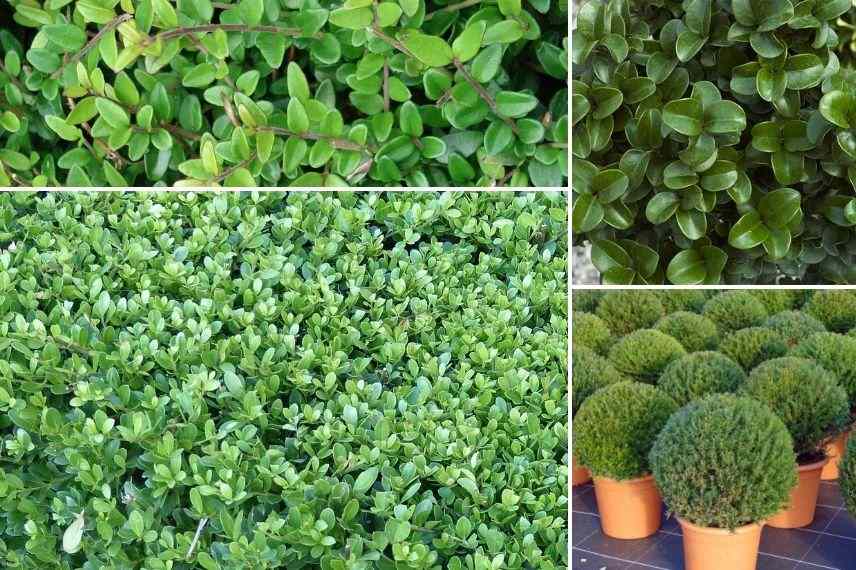
Lonicera nitida top left, Ligustrum japonicum top right (photo Wikipedia), Ilex crenata ‘Dark Green’ bottom left, and Taxus baccata in pot
Read also
Topiary: when and how to prune them?Choose plants that flower for a long time
To enjoy your welcoming entrance for as long as possible, look for plants that have a long flowering period. Some plants, like Narcissus, make a lovely impact at the arrival of spring; however, their flowering duration is very short throughout the season. Therefore, it is worthwhile to favour plants with long flowering periods to prolong the pleasure of returning home each day through a beautiful entrance. There is no shortage of choices; here is our selection.
Sun exposure
- Hibiscus syriacus ‘French Cabaret Purple’, in a large pot, flowers from August to October
- Erica darleyensis ‘Darley Dale’ with winter flowering from November to March
- the Calycanthus raulstonii ‘Hartlage Wine’ with purple-red perpetual flowering from May to June and then from August to September
Partial shade exposure
- Hydrangea which generally flowers from June to October
- Weigela ‘All Summer Red’ with bright red perpetual flowering from April to September
- the Potentilla fruticosa ‘Lovely Pink’ which produces small pink flowers from May to September
Shade exposure
- the Michelia figo which flowers from April to August and diffuses a banana scent
- Fuchsia x hybrida ‘Blue Sarah’ revealing bicoloured blue and white bells from June to October

Hibiscus ‘French Cabaret Purple’, Weigela ‘All Summer Red’ and Michelia figo.
Prefer easy-to-grow plants
To make your work easier, plant young plants that require little maintenance and are easy to grow, needing only light pruning or none at all, with low water requirements and good disease resistance.
Sun exposure
- Sedum spectabile ‘Septemberglut’
- Phlox subulata ‘Candy Stripes’
- Iberis sempervirens
- Gaillardia grandiflora ‘Mesa Yellow’
- Coreopsis ‘Citrine’
- Geranium sanguineum striatum
Partial shade exposure
- Heuchera micrantha ‘Palace Purple’
- Anemone ‘Little Summer Breeze’
- Carex morrowii ‘Ice Dance’
Shade exposure
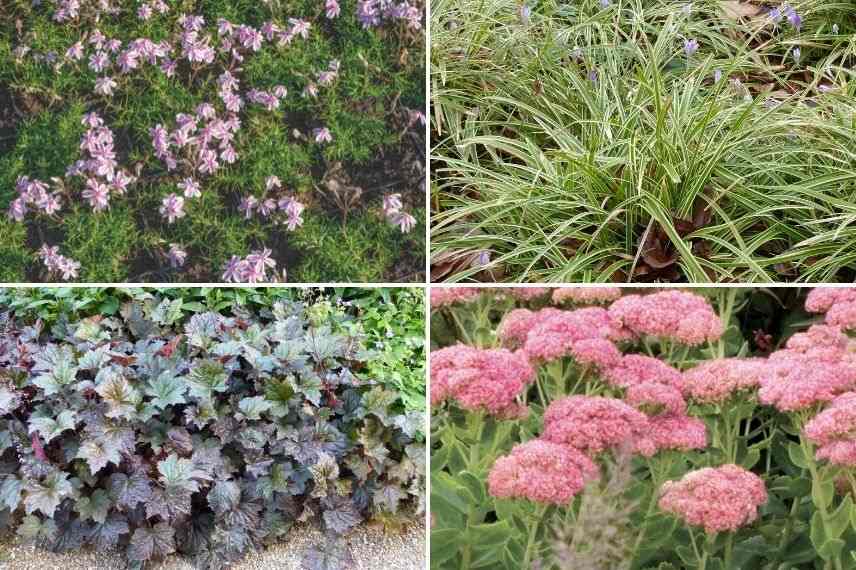
Phlox ‘Candy Stripes’, Carex ‘Ice Dance’, Heuchera ‘Palace Purple’ and Sedum ‘Septemberglut’
Let yourself be enchanted by fragrant plants
To welcome your visitors, nothing is more pleasant than the sweet scent of a plant! Here is our selection of plants with delightfully fragrant flowering:
Sun exposure
- the Lavender which offers numerous varieties with varying scents
- Trachelospermum asiaticum with summer flowering
- the Rose ‘Borneo Odore’ with large, extraordinarily fragrant flowers
- the Thymus citriodorus ‘Silver Queen’ with variegated foliage and a lemon scent
Partial shade exposure
- the Trachelospermum asiaticum ‘Ogon-Nishiki’ with a strong sweet and vanilla scent
- Philadelphus lemoinei ‘Manteau d’Hermine’ with its very fragrant white flowers
Shade exposure
- the Sarcococca hookeriana ‘Digyna’ with fragrant winter flowering
- Viola odorata which diffuses a sweet scent in early spring

Rose ‘Borneo Odore’, Philadelphus ‘Manteau d’Hermine’ and Sarcococca ‘Digyna’
Mistake to avoid
Whether along your driveway leading to the house or in a pot at your doorstep, avoid planting thorny bushes such as Berberis, Holly, thorny cacti, Aralia, Mahonia, Paliurus, or Pyracantha.
- Subscribe!
- Contents
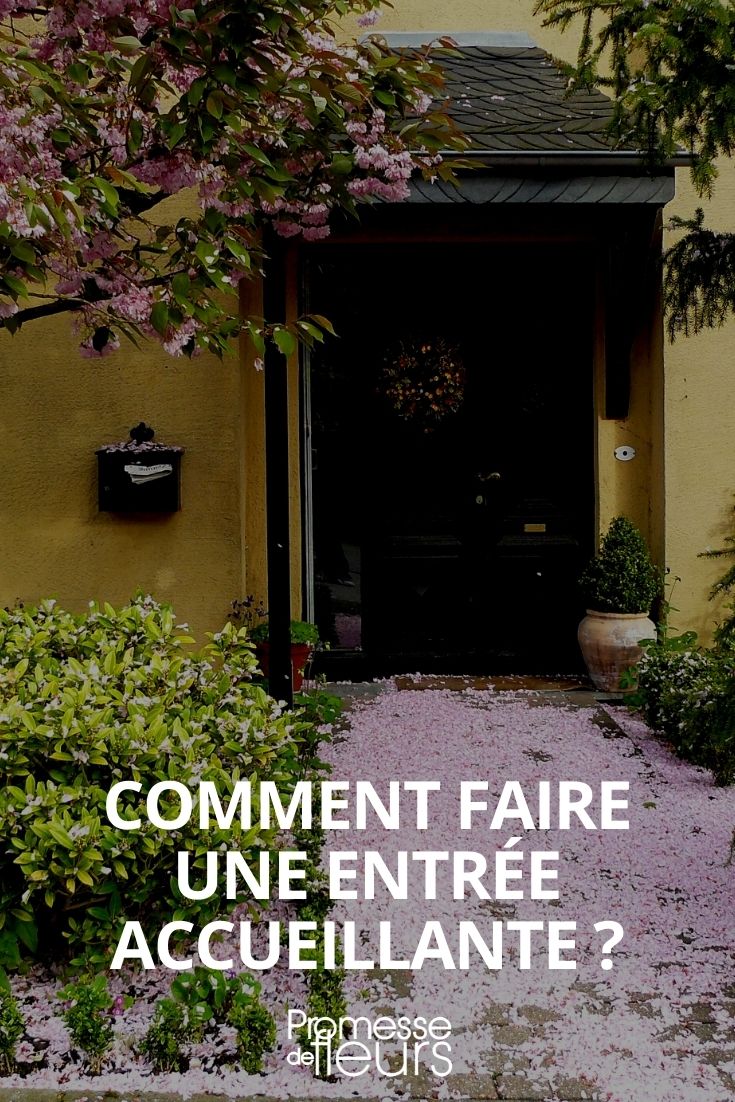






























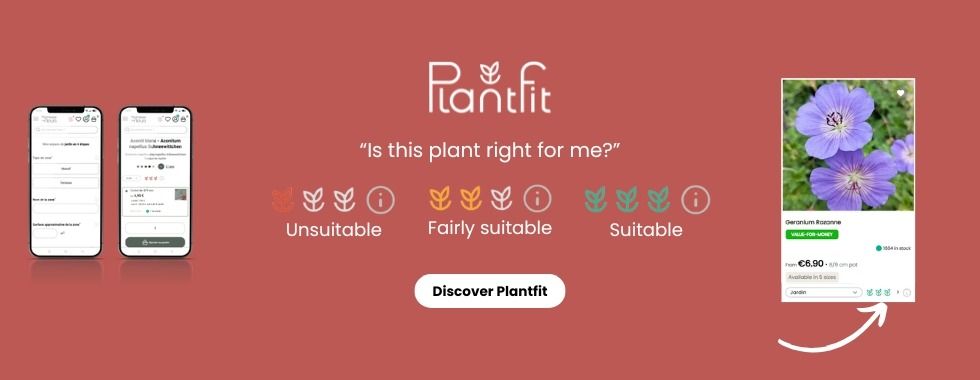
Comments